人教版(2019)选择性必修 第四册Unit 4 Sharing Using Language Listening and Speaking课件(共23张PPT,内镶嵌音频)
文档属性
| 名称 | 人教版(2019)选择性必修 第四册Unit 4 Sharing Using Language Listening and Speaking课件(共23张PPT,内镶嵌音频) | 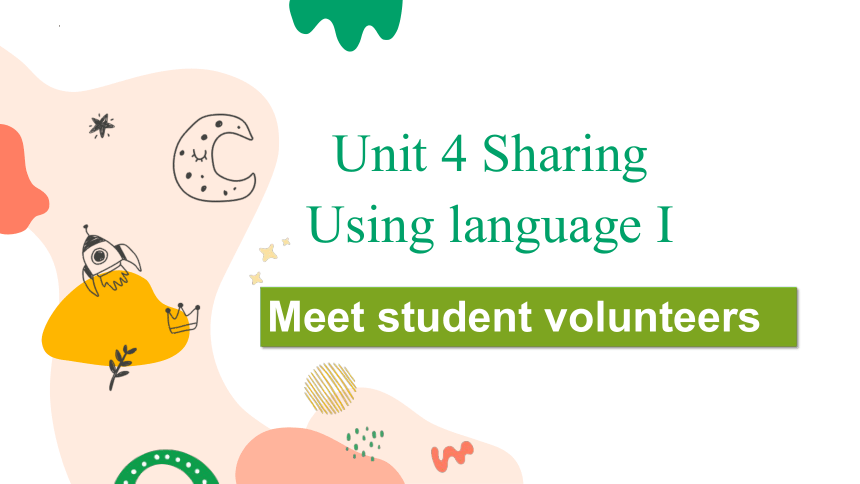 | |
| 格式 | pptx | ||
| 文件大小 | 7.1MB | ||
| 资源类型 | 教案 | ||
| 版本资源 | 人教版(2019) | ||
| 科目 | 英语 | ||
| 更新时间 | 2025-02-19 11:36:11 | ||
图片预览

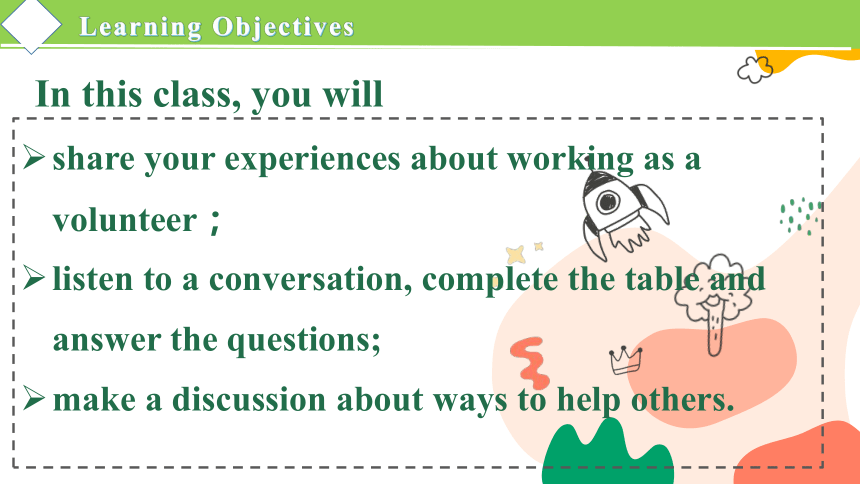
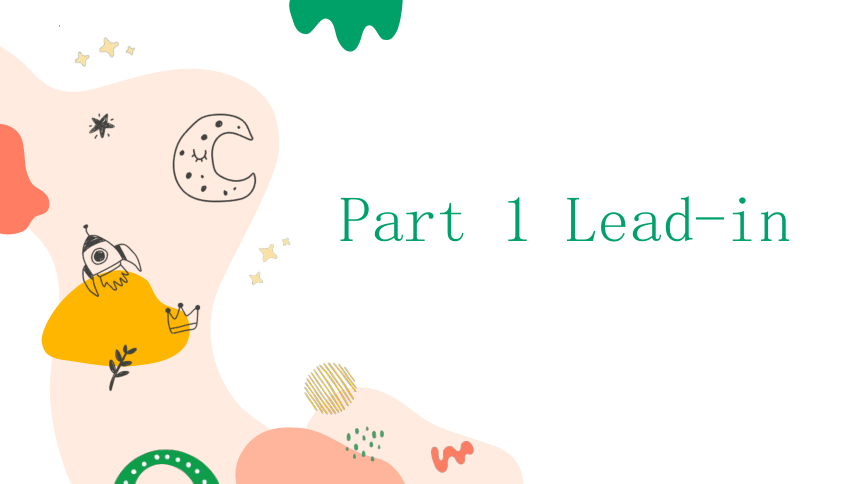

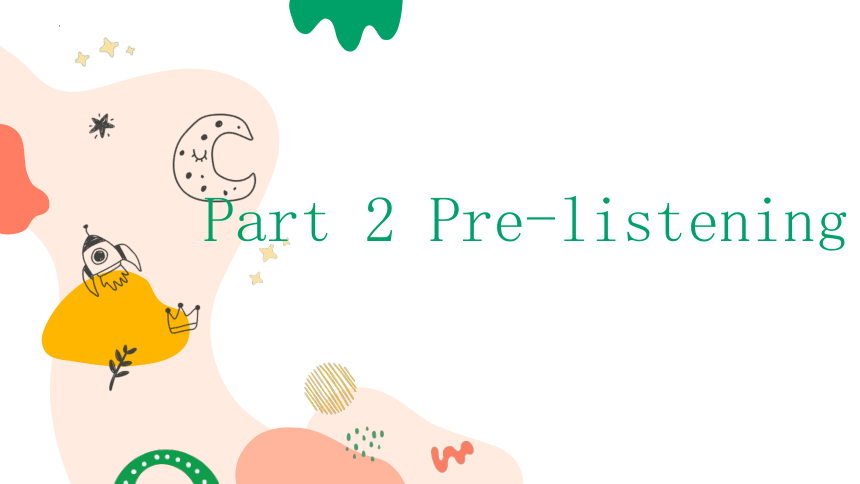
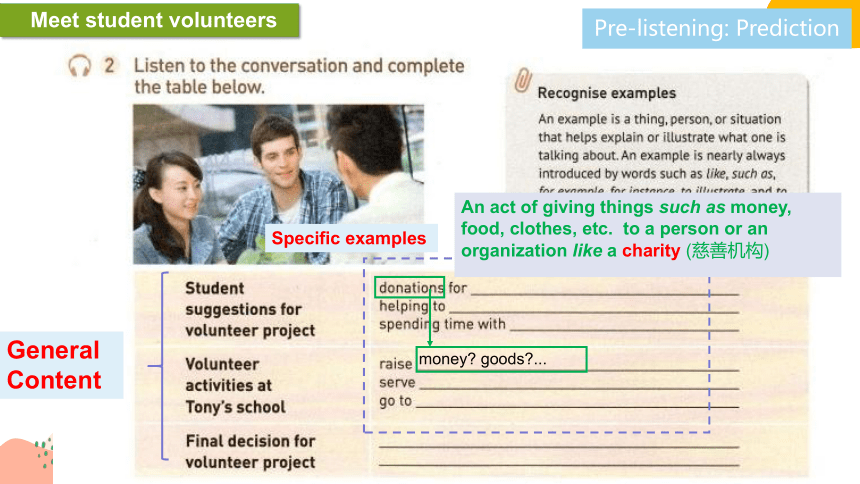

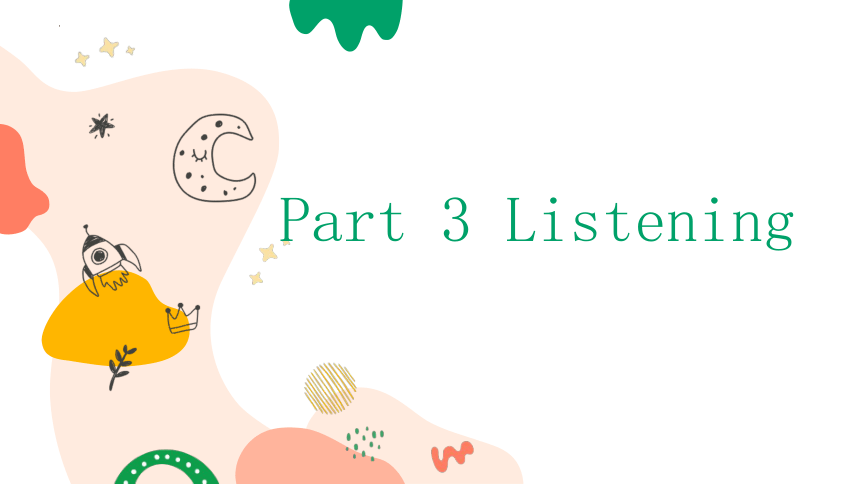
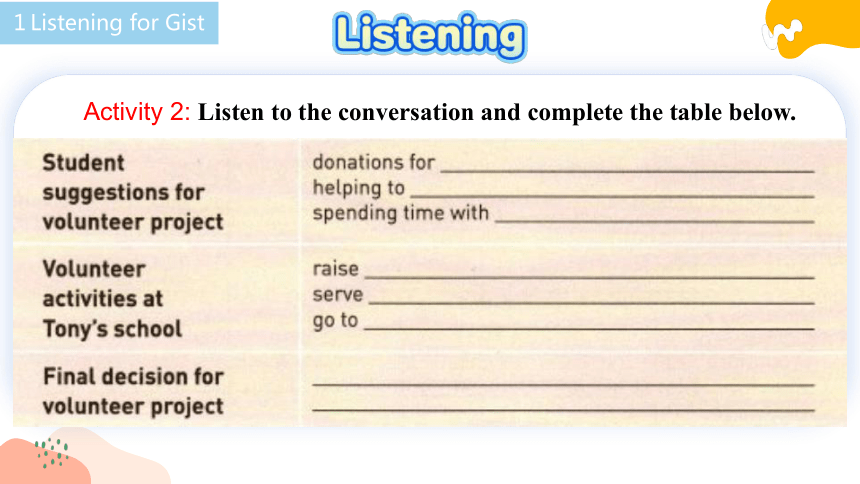
文档简介
(共23张PPT)
Unit 4 Sharing
Using language I
Meet student volunteers
Learning Objectives
In this class, you will
share your experiences about working as a volunteer;
listen to a conversation, complete the table and answer the questions;
make a discussion about ways to help others.
Part 1 Lead-in
What's the purpose
Where did you go
What did you do
About
Volunteer Project
Picking up litter
in the community
Helping the elderly in nursing homes
Raising money to charity
Donating blood to save lives
Part 2 Pre-listening
General Content
Specific examples
Pre-listening: Prediction
An act of giving things such as money, food, clothes, etc. to a person or an organization like a charity (慈善机构)
money goods ...
Meet student volunteers
Listening strategy
Recognise examples
An example is a thing, person, or situation that helps explain or illustrate what one is talking about.
An example is nearly always introduced by words such as like, such as, for example, for instance, to illustrate, and to demonstrate.
Pre-listening
P42
Part 3 Listening
Activity 2: Listen to the conversation and complete the table below.
1 Listening for Gist
Student suggestions for
volunteer project donations for things such as _____________________
helping to clean up the ____________, taking down ______ from walls and __________________
spending time with __________________________________
Volunteer activities at Tony's school raise ________to give to a ___________________
serve food to ____________ people
go to a children's hospital to ___________ all the little kids there
Final decision for volunteer project ________________________________________________________________________________________________________
pens and notebooks
the elderly, playing games, singing or chatting
contact a children's hospital and ask how they could help
1 Listening for Gist
community
ads
picking up litter
money
different charity
homeless
cheer up
Activity 3: Listen to the conversation again and then answer the following questions.
1. Why does Tony want to join the meeting for student volunteers
2. What is the objective of the meeting today
3. What kind of volunteer work did the students do last year
4. What kind of volunteer work does Tony’s entire school do
every year
5. Who suggests going to the children’s hospital for this year’s
volunteer project
Underline the keywords first.
2 Listening for Details
1. Why does Tony want to join the meeting for student
volunteers
2. What is the objective of the meeting today
He used to volunteer at his high school in America, so he wanted to try it in China.
It is to talk about what kind of volunteer project they should do this term.
2 Listening for Details
3. What kind of volunteer work did the students do last year
4. What kind of volunteer work does Tony’s entire school do
every year
They organised donations of school supplies for poor students.
Every year, they raise money to give to a different charity.
5. Who suggests going to the children’s hospital for this year’s
volunteer project
Wang Li.
2 Listening for Details
听力原文
Tony: Hi! Is this the meeting for student volunteers
Wang Li: Hi!Tony! Yes it is!
Tony: Oh, hi, Wang Li! I used to volunteer at my high school in America so I wanted to try it here in China.
Peipei: We’re glad you’re here! Our meeting today is to talk about what kind of volunteer project we should do this term.
Wang Li: Peipei, may I suggest that we do something for schools in poor areas Perhaps we could organise donations of things such as pens and notebooks or other school supplies for poor
students.
Peipei: Good idea, but we did that last year. Wouldn’t it be better if we did something different this year, like organising students to volunteer their time
Wang Li: Like what
Peipei: Well, like cleaning up the community, taking down ads from walls and picking up litter.
It might be a good idea to contact the community office and ask how we can help. Do you guys have any other ideas
Wang Li: How about writing to some nursing homes to see if they need someone to spend time with the elderly people We can play games, sing, or just chat!
Tony: That sounds like one of my school’s volunteer projects.
Wang Li: Really What other volunteer projects does your school take part in
Tony: Oh, all kinds. Every year, our whole school raises money to give to a different charity.
For instance, we donated to a medical charity last year and to an education charity before
that. We raise money in different ways, such as by making and selling things or holding a marathon and asking people to promise to donate for every kilometre we run. We also have weekly volunteer groups.
Peipei: That sounds interesting! What do the groups do
Tony: Well, on Fridays, there are student volunteers who help serve food to homeless people. And on Saturday mornings, a group of students goes to a children’s hospital to cheer up all the
little kids there.
Wang Li: Hey, I was also thinking we could contact a children’s hospital and ask how we could help. How does that idea sound, Peipei
Peipei: I love that idea! Thanks,Tony and Wang Li!
Tony: No problem, I’m glad to help. Volunteering is something we should all do.
Part 4 Post-listening
Post-listening
1. Do you think students doing volunteer work is of any use Why or why not
I think doing volunteer work is of ___(great/vital) value, because…
2. In your opinion, which is better, giving people things, time, or money Why do you think so
In my opinion, __________ is better, since….
Volunteering is something we should all do.
Activity 4: Think about the following questions and discuss your ideas with your groups.
=useful
be of little value (n.)
be of great importance (n.)
Activity 5: In groups, talk about ways to help others.
What kinds of help do you think people need
How do you think volunteers could help
Purpose Place Activity
… … …
Volunteer work
Post-listening
Post-listening
2. What kinds of skills and qualities could you offer as a volunteer
Post-listening
skill
Quality
A simple act of caring creates an endless ripple that comes back to you.
小小的善举能激起无限的爱的涟漪。
Design a volunteer project for your community to call on people to donate old clothes to help the needy.
Finish the Pronunciation exercise on Page 43 and the Workbook exercise on Page 84
Thank you for your listening.
Unit 4 Sharing
Using language I
Meet student volunteers
Learning Objectives
In this class, you will
share your experiences about working as a volunteer;
listen to a conversation, complete the table and answer the questions;
make a discussion about ways to help others.
Part 1 Lead-in
What's the purpose
Where did you go
What did you do
About
Volunteer Project
Picking up litter
in the community
Helping the elderly in nursing homes
Raising money to charity
Donating blood to save lives
Part 2 Pre-listening
General Content
Specific examples
Pre-listening: Prediction
An act of giving things such as money, food, clothes, etc. to a person or an organization like a charity (慈善机构)
money goods ...
Meet student volunteers
Listening strategy
Recognise examples
An example is a thing, person, or situation that helps explain or illustrate what one is talking about.
An example is nearly always introduced by words such as like, such as, for example, for instance, to illustrate, and to demonstrate.
Pre-listening
P42
Part 3 Listening
Activity 2: Listen to the conversation and complete the table below.
1 Listening for Gist
Student suggestions for
volunteer project donations for things such as _____________________
helping to clean up the ____________, taking down ______ from walls and __________________
spending time with __________________________________
Volunteer activities at Tony's school raise ________to give to a ___________________
serve food to ____________ people
go to a children's hospital to ___________ all the little kids there
Final decision for volunteer project ________________________________________________________________________________________________________
pens and notebooks
the elderly, playing games, singing or chatting
contact a children's hospital and ask how they could help
1 Listening for Gist
community
ads
picking up litter
money
different charity
homeless
cheer up
Activity 3: Listen to the conversation again and then answer the following questions.
1. Why does Tony want to join the meeting for student volunteers
2. What is the objective of the meeting today
3. What kind of volunteer work did the students do last year
4. What kind of volunteer work does Tony’s entire school do
every year
5. Who suggests going to the children’s hospital for this year’s
volunteer project
Underline the keywords first.
2 Listening for Details
1. Why does Tony want to join the meeting for student
volunteers
2. What is the objective of the meeting today
He used to volunteer at his high school in America, so he wanted to try it in China.
It is to talk about what kind of volunteer project they should do this term.
2 Listening for Details
3. What kind of volunteer work did the students do last year
4. What kind of volunteer work does Tony’s entire school do
every year
They organised donations of school supplies for poor students.
Every year, they raise money to give to a different charity.
5. Who suggests going to the children’s hospital for this year’s
volunteer project
Wang Li.
2 Listening for Details
听力原文
Tony: Hi! Is this the meeting for student volunteers
Wang Li: Hi!Tony! Yes it is!
Tony: Oh, hi, Wang Li! I used to volunteer at my high school in America so I wanted to try it here in China.
Peipei: We’re glad you’re here! Our meeting today is to talk about what kind of volunteer project we should do this term.
Wang Li: Peipei, may I suggest that we do something for schools in poor areas Perhaps we could organise donations of things such as pens and notebooks or other school supplies for poor
students.
Peipei: Good idea, but we did that last year. Wouldn’t it be better if we did something different this year, like organising students to volunteer their time
Wang Li: Like what
Peipei: Well, like cleaning up the community, taking down ads from walls and picking up litter.
It might be a good idea to contact the community office and ask how we can help. Do you guys have any other ideas
Wang Li: How about writing to some nursing homes to see if they need someone to spend time with the elderly people We can play games, sing, or just chat!
Tony: That sounds like one of my school’s volunteer projects.
Wang Li: Really What other volunteer projects does your school take part in
Tony: Oh, all kinds. Every year, our whole school raises money to give to a different charity.
For instance, we donated to a medical charity last year and to an education charity before
that. We raise money in different ways, such as by making and selling things or holding a marathon and asking people to promise to donate for every kilometre we run. We also have weekly volunteer groups.
Peipei: That sounds interesting! What do the groups do
Tony: Well, on Fridays, there are student volunteers who help serve food to homeless people. And on Saturday mornings, a group of students goes to a children’s hospital to cheer up all the
little kids there.
Wang Li: Hey, I was also thinking we could contact a children’s hospital and ask how we could help. How does that idea sound, Peipei
Peipei: I love that idea! Thanks,Tony and Wang Li!
Tony: No problem, I’m glad to help. Volunteering is something we should all do.
Part 4 Post-listening
Post-listening
1. Do you think students doing volunteer work is of any use Why or why not
I think doing volunteer work is of ___(great/vital) value, because…
2. In your opinion, which is better, giving people things, time, or money Why do you think so
In my opinion, __________ is better, since….
Volunteering is something we should all do.
Activity 4: Think about the following questions and discuss your ideas with your groups.
=useful
be of little value (n.)
be of great importance (n.)
Activity 5: In groups, talk about ways to help others.
What kinds of help do you think people need
How do you think volunteers could help
Purpose Place Activity
… … …
Volunteer work
Post-listening
Post-listening
2. What kinds of skills and qualities could you offer as a volunteer
Post-listening
skill
Quality
A simple act of caring creates an endless ripple that comes back to you.
小小的善举能激起无限的爱的涟漪。
Design a volunteer project for your community to call on people to donate old clothes to help the needy.
Finish the Pronunciation exercise on Page 43 and the Workbook exercise on Page 84
Thank you for your listening.
